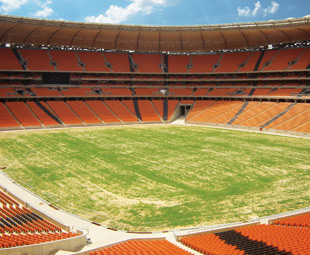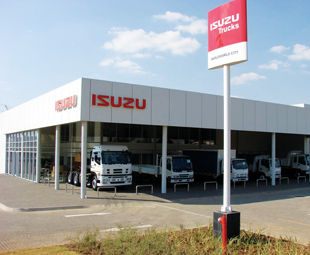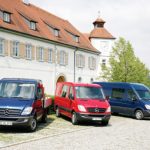Proudly South African

Keeping customers happy is what truck manufacturers and dealerships are all about, but it’s important for manufacturers to have their own identity as well, not only through their product, but also through their corporate identity. NADINE VON MOLTKE recently attended a press day where Isuzu Truck SA reiterated its position as an “after-sales company that happens to sell trucks”, as well as a company that is proudly South African.
Last year, during the Johannesburg International Motor Show (JIMS) held in October, Isuzu Truck differentiated itself by taking the press on a site tour of Soccer City, South Africa’s flagship stadium for the 2010 FIFA Soccer World Cup.
The reason behind the visit? Simply to facilitate the showcasing of one of South Africa’s construction marvels. One year after the original visit, the manufacturer managed to work its magic again – this time for a second site visit just before completion earmarked for December 2009.
“It’s something different, it’s fun and it aligns our goals with those of the best in South African industry – which is exactly where we want to be,” says Craig Uren, chief operations officer at Isuzu Truck SA (Isuzu Truck).
“Soccer City is a phenomenal achievement,” he continues. “It’s on track in terms of its completion targets; the contractors involved have all achieved extraordinary safety standards; and it’s an unbelievably impressive building. It makes you proud to be a member of our host nation, which is exactly how we feel at Isuzu Truck SA, and why we liked the synergy of facilitating these site tours.”
And the stadium is indeed spectacular. Designed to look like an African “calabash” pot, the external structure is made up of 22 000 panels consisting of seven different colours and three different textures, each panel with its own specific position.
The roof weighs in at an impressive 7 000 t, and took three cranes to assemble, each of which needed to be sourced and brought over from Italy. “No South African structure has ever had the need for such cranes,” explains Zoran Lazarevski, Soccer City’s site engineer.
The stadium’s foundation is made up of 1 500 “piles” and consists of 6 400 t of reinforcing bars (rebars), and altogether Soccer City seats 94 000 spectators.
Sitting in the empty, almost finished stadium and looking down at the already-laid pitch is a truly awesome experience. The silence of the stadium is almost eerie, particularly as our visiting site group sits quietly and imagines the intensity of the opening game crowd, due to fill these very stands in only a few month’s time.
As lunch time (and our site visit) comes to an end and the bustle of the construction site resumes, Lazarevski informs us that there are in excess of 3 500 people performing various functions on site, and that the entire site is nearing the magic number: one million disabling injury-free man hours. It’s a number for everyone who has contributed to the stadium’s construction to feel proud of, and we leave the stadium feeling elated and proudly South African because of them.
Local considerations
Of course, while Isuzu Truck’s gift to us has been not only an exclusive glimpse into the World Cup’s flagship stadium, but some welcome positivity among the worries, stress and nay-saying associated with 2010’s event, the day was also about the manufacturer itself.
The economic downturn has resulted in manufacturers taking a backseat in terms of public exposure while quietly looking after their clients and their needs. That is not to say that nothing has been happening, but rather that the focus has been less on sales than on after-sales support – something Isuzu Truck has shaped its corporate identity on since entering the South African market.
 “I’ve repeatedly stated that we’re a parts and after-sales service company that also happens to sell trucks,” says Uren, “and the current economic situation has not changed that. If anything it’s strengthened this ideal and how important it is to support our customers.”
“I’ve repeatedly stated that we’re a parts and after-sales service company that also happens to sell trucks,” says Uren, “and the current economic situation has not changed that. If anything it’s strengthened this ideal and how important it is to support our customers.”
The manufacturer is also receiving huge support from its dealerships. Take for example Barloworld City Deep, an amalgamation of three dealerships into one, situated at the heart of City Deep in Johannesburg.
Huge investment on behalf of Barloworld has secured a joint GM/Isuzu Truck facility on a 35 000m2 property, of which
7 000 m2 is under cover for trucks, and a further 2 000 m2 houses the parts department, totalling an estimated R30 million at any given time. It is also the facility that houses Isuzu Truck’s demo trucks in the Johannesburg region.
“The parts and services department is maintaining the dealership at the moment,” admits Vernon Meakin, Barloworld City Deep’s dealer principal. “Sales are naturally slow, but the needs of our existing customer base are keeping us busy and our ability to provide a quick and efficient service delivery is ensuring them maximum uptime.”
The heritage of Barloworld, GM and Isuzu Truck as big industry players means that the dealership has the space, capital and expertise to ensure adequate parts stocks, which in turn allows it to look after its various customers and provide them with what they need, timeously and efficiently. In a business where uptime means everything, the ability to have a constant flow of parts is extremely important.
“We pride ourselves on this aspect of our business, just as Isuzu Truck does,” says Meakin. “It’s one of the reasons why manufacturer and dealer work so well in our case.”
Uren concurs. “Our motto, ‘for the long run’, is based on this very idea: after-sales support. But to achieve this support, we need to work closely with our dealers and rely on them to deliver on our rigorous standards.”
This year, Isuzu’s internationally popular N-Series range also turns 50 in terms of its global roll-out, and the manufacturer continues to set it sights on achieving the number one spot in local medium commercial vehicle sales.
“We are already number one in over 25 markets worldwide, and this is our aspiration for South Africa too,” says Uren. “We believe that, through strong after-sales support, we will achieve our goals.”
Since the manufacturer has only officially been operating in the local market for three years, its position and continued growth are not only impressive, but bode well for achieving this goal.
“Dealer spend on Isuzu Truck’s dealer network amounts to R350 million and we are nearing completion,” he continues. “Between 70 and 80% of the upgrades and construction are already completed and we are now actively moving towards our long-term goals.
“Lack of finance and a market that is down almost 50% compared to last year are obviously huge stumbling blocks, and no one can brush aside what has happened to our industry over the past few months, but the encouraging thing for both us and our customers who operate our product is that we are not going anywhere.
“We have invested in this market and plan to continue to contribute to South Africa’s growth and economy.”
While admitting that even contemplating what local industry sectors would be like without the promises of 2010 is daunting, Uren also points out that figures are already getting better, and that October in particular should see an increase in sales.
“We are a mature market,” he says. “Sales are poor, but they are also where they were five years ago. We might not be experiencing the growth we had grown accustomed too, but South Africa itself will continue to grow and operate, which is good news for us. As long as we maintain our standards and support our customer base, we will weather this storm.
“Our strong focus on after sales and service allows our products to have a home in the local market, because customers know they will be taken care of, which in turn gives us staying power.”
Published by
Focus on Transport
focusmagsa




